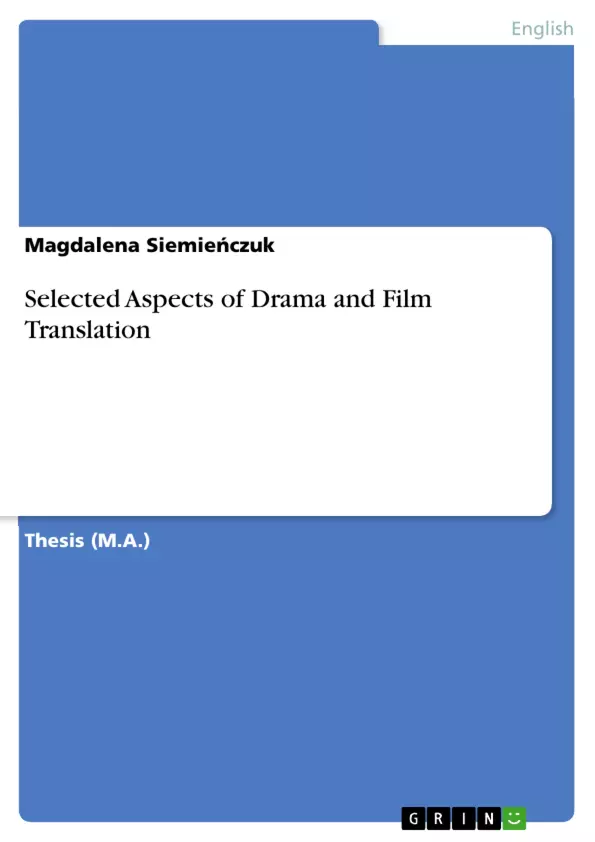
Selected Aspects of Drama and Film Translation
Magisterarbeit, 2009
49 Seiten, Note: 6.0
Leseprobe
Inhaltsverzeichnis (Table of Contents)
- INTRODUCTION.
- CHAPTER I: SKOPOS THEORY
- 1.1. INTRODUCTION…..\n
- 1.2. SKOPOS THEORY IN THE HISTORICAL CONTEXT.\n
- 1.3. SKOPOS THEORY IN THE EXPRESSIVE TEXT TYPES..\n
- CHAPTER II: DRAMA TRANSLATION PROBLEMS
- 2.1. INTRODUCTION......\n
- 2.2. TRANSLATION OF THE EXPRESSIVE TYPE LITERATURE.\n
- 2.3. DRAMA AND MOVIE TRANSLATION THEORY.\n
- CHAPTER III: SUCCESSFUL TRANSLATIONS
- 3.1. INTRODUCTION...\n
- 3.2. ANALYSIS OF THEATRICAL TEXTS..\n
- CONCLUSION.
Zielsetzung und Themenschwerpunkte (Objectives and Key Themes)
This paper aims to explore the application of Skopos theory in the context of literary translation, specifically focusing on plays, comedies, dramas, and screenplays. It emphasizes the importance of considering the receiver's needs and expectations in the translation process, particularly in the media world where audience reception significantly influences the success of theatrical performances and films.
- The role of Skopos theory in literary translation.
- The importance of cultural context and audience reception in translation.
- The application of Skopos theory to drama and film translation.
- An analysis of successful translations of English-Polish and Polish-English plays.
- The intersection of translation theory and theatre practice.
Zusammenfassung der Kapitel (Chapter Summaries)
Chapter One delves into the history of translation and introduces the Skopos theory, highlighting its significance for translating expressive type literature. It explores the development of translation theory from antiquity to modern times and emphasizes why Skopos theory stands out as the most suitable approach for literary translations.
Chapter Two focuses on the challenges and strategies involved in translating expressive type literature, particularly theatrical plays and screenplays. It examines the specific demands of translating for the theatre industry, media world, and film productions.
Schlüsselwörter (Keywords)
This paper explores key concepts such as Skopos theory, literary translation, expressive text types, drama translation, film translation, cultural context, audience reception, successful translations, and the relationship between translation theory and theatre practice.
Frequently Asked Questions
What is Skopos theory in translation?
Skopos theory emphasizes the purpose (skopos) of the translation and the needs of the target audience, rather than just linguistic equivalence with the source text.
How does Skopos theory apply to drama and film?
In drama and film, the translation must meet the expectations of actors, directors, and the audience to ensure the performance is understandable and effective on stage or screen.
Why is cultural context important in literary translation?
Cultural context determines how the audience perceives humor, emotion, and social dynamics in a play, making it vital for the translator to adapt these elements for the target culture.
Who is Stanisław Barańczak in the context of this paper?
Stanisław Barańczak is cited as one of the greatest Polish translators whose experience in translating theatrical texts is analyzed alongside acting theories like those of Stanislavski.
What are the challenges of translating expressive text types?
Challenges include maintaining the artistic style, the rhythm of dialogue for actors, and ensuring that the emotional impact of the original work is preserved in the translation.
Details
- Titel
- Selected Aspects of Drama and Film Translation
- Hochschule
- Uniwersytet Łódzki (Philology)
- Veranstaltung
- English Philology
- Note
- 6.0
- Autor
- Magdalena Siemieńczuk (Autor:in)
- Erscheinungsjahr
- 2009
- Seiten
- 49
- Katalognummer
- V310612
- ISBN (eBook)
- 9783668129047
- ISBN (Buch)
- 9783668129054
- Dateigröße
- 816 KB
- Sprache
- Englisch
- Schlagworte
- selected aspects drama film translation
- Produktsicherheit
- GRIN Publishing GmbH
- Preis (Ebook)
- US$ 19,99
- Preis (Book)
- US$ 29,99
- Arbeit zitieren
- Magdalena Siemieńczuk (Autor:in), 2009, Selected Aspects of Drama and Film Translation, München, Page::Imprint:: GRINVerlagOHG, https://www.diplomarbeiten24.de/document/310612
- Autor werden
- Ihre Optionen
- Vertriebskanäle
- Premium Services
- Autorenprofil
- Textarten und Formate
- Services für Verlage, Hochschulen, Unternehmen

- © GRIN Publishing GmbH.
- Alle Inhalte urheberrechtlich geschützt. Kopieren und verbreiten untersagt.
- info@grin.com
- AGB
- Open Publishing
Der GRIN Verlag hat sich seit 1998 auf die Veröffentlichung akademischer eBooks und Bücher spezialisiert. Der GRIN Verlag steht damit als erstes Unternehmen für User Generated Quality Content. Die Verlagsseiten GRIN.com, Hausarbeiten.de und Diplomarbeiten24 bieten für Hochschullehrer, Absolventen und Studenten die ideale Plattform, wissenschaftliche Texte wie Hausarbeiten, Referate, Bachelorarbeiten, Masterarbeiten, Diplomarbeiten, Dissertationen und wissenschaftliche Aufsätze einem breiten Publikum zu präsentieren.
Kostenfreie Veröffentlichung: Hausarbeit, Bachelorarbeit, Diplomarbeit, Dissertation, Masterarbeit, Interpretation oder Referat jetzt veröffentlichen!
- GRIN Verlag GmbH
-
- Nymphenburger Str. 86
- 80636
- Munich, Deutschland
- +49 89-550559-0
- +49 89-550559-10
- info@grin.com
-









